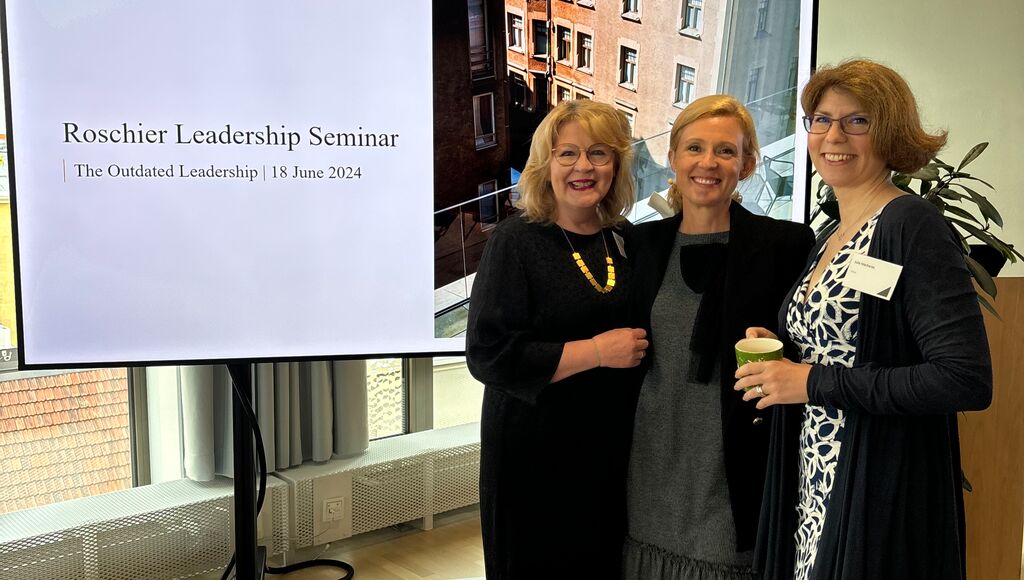
The outdated leadership: Roschier Leadership Seminars
Insights|June 20, 2024
This week, we hosted the second part of the Roschier Leadership Seminars in Helsinki, focusing on the theme of outdated leadership. The breakfast event started with an introduction by our partner, Johanna Flythström. The guests this time were Eija Hakakari, Director of HR, Security, and Sustainability at YLE, and Julia Macharey, Head of People and Culture at Orion. The discussion was moderated by Christina Dahlblom.
During the seminar, three key findings emerged regarding modern leadership:
- Leadership priorities must evolve to match different organizational phases, such as growth, cost-cutting, and market expansion.
- Balancing leadership and management is essential to foster an environment that promotes clarity and psychological safety.
- Leaders should find their unique paths and engage in continuous self-reflection to maintain their relevance and effectiveness.
These findings were thoroughly explored through the experiences and insights shared by our distinguished guests. The event began with the guests briefly recounting their careers and reflecting on the leadership styles they had encountered. Eija Hakakari, who has had a distinguished career in several major Finnish companies, shared her insights. She began her career at the Finnish postal services in the 1980s, where she developed a goal-oriented leadership approach. At KPMG, she encountered leadership that valued performance management and ethical considerations. Her tenure in China exposed her to an authoritarian leadership style, and she was tasked with integrating Western values into the local leadership culture. Later, at Finnair, Eija witnessed the transformation of the company from a cost-cutting entity to a profitable enterprise, where involving employees in strategic processes proved revolutionary.
Eija shared a story about the introduction of the Boeing A350 at Finnair, highlighting the importance of involving stakeholders in decision-making. The first A350, named Vilma, was an example of this approach. The marketing team initially worked on ways to present the aircraft to customers, but it wasn’t until the pursers and cabin crew contributed their ideas on service delivery that the final concept came together. This collaboration led to the creation of a comprehensive service model for the aircraft, demonstrating the value of inclusive leadership.
Julia Macharey began her career at Lufthansa but left after six months, realizing the crucial role of company and leadership culture. She observed that the authoritarian leadership style common in the aviation industry was necessary for safety. Later, during her time at a company in Manchester undergoing a hostile takeover, she encountered employees with military or criminal backgrounds, which further underscored the need for a strict leadership approach in specific situations.
During the seminar, Eija and Julia agreed that effective leaders must sometimes deliver clear, unambiguous messages. However, they emphasized that leadership should not be reduced to merely issuing instructions. Leadership is a multifaceted process that evolves, and different styles are required at different times. The key to effective leadership is the ability to listen and foster a company culture where everyone feels included.
When discussing contemporary challenges in leadership, Eija highlighted issues such as AI and fake news. She stressed the importance of bringing people together to discuss the role of technology in our lives, and inspiring individuals to be both brave and responsible. She also emphasized the importance of maintaining a human touch in all actions.
An audience member raised a point about the challenge of maintaining social connections and a sense of belonging in an era where remote work is common. They noted that while employees might feel productive working from home, they may not contribute as much to the organization in terms of onboarding newcomers and fostering team cohesion. Julia responded that the cost of office space is less concerning than the potential loss of competitiveness and profitability that could result from a weakened working community. She also expressed concerns about the long-term impacts of the pandemic on young people who have had to build their professional identities in isolation.
Addressing the concept of outdated leadership, Eija identified three key considerations. First, leadership is not a trend; it involves different phases such as growth, cost-cutting, and market expansion, each requiring a different leadership emphasis. Second, there is a distinction between leadership and management; while both are necessary, a balance must be struck to ensure clarity and psychological safety. Third, leadership cannot be imitated. Leaders must find their own paths and learn to lead in a way that has the most positive impact on their organizations. “You must know your business and your people, but first of all, you must know yourself,” Eija said. “You will never be outdated if you periodically reflect on your approach.”
Julia added that transparency is crucial in leadership. She argued that it is impossible to lead experts effectively without keeping them informed about what is happening and why decisions are made. The outdated “one size fits all” approach does not work, and holding information exclusively among a select group disengages employees. For organizations to remain dynamic, leaders must be attuned to the sentiments and actions of their teams.
The seminar concluded with a consensus that while some aspects of traditional leadership remain valuable, modern leadership must adapt to evolving challenges and emphasize inclusivity, transparency, and adaptability.
The Roschier Leadership Seminar series started in 2023. Please find the previous articles in the links below. The seminar series will continue in the fall.
Caroline Farberger and Annie Lööf on value-based leadership
Peter Wallenberg Jr. and Lovisa Cavalli Wallenberg on leadership over time and generations
Hans Stråberg on ultimate leadership
Ambassador Judith Gough on the art of diplomacy
Ice hockey legend and Olympic gold medalist Mats Sundin on sustainable leadership
Ambassadors Wegger Strømmen, Nicola Clase, and Jakob Nymann-Lindegren on diplomatic leadership